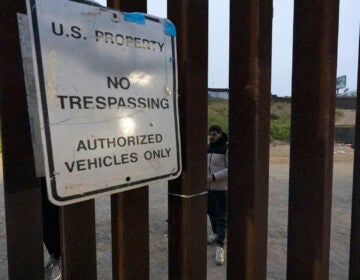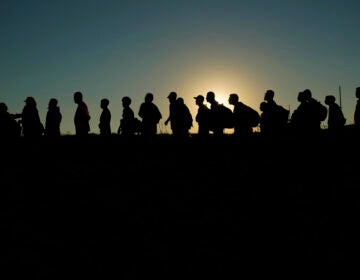U.S. Rep. Dean recounts ‘chilling’ and ‘inhumane’ conditions at Texas, Fla. detention centers
WHYY Morning Edition host Jennifer Lynn interviews U.S. Rep. Madeleine Dean about her visit to America’s only privately-run detention facility for child migrants.
Listen 8:50
Rep. Madeleine Dean, D-Pa., speaks during a panel discussion at Delaware County Community College, Friday, May 24, 2019, in Media, Pa. (Matt Slocum/AP Photo)
U.S. Rep Madeleine Dean, D-Montgomery County, says she witnessed “chilling” conditions while touring facilities where migrants are being held in Texas and Florida.
Public access to facilities where the U.S. Customs and Border Patrol is holding migrants is limited, but Dean and other members of Congress who visited the facilities called the conditions “inhumane.”
Dean is back in the region and spoke with WHYY Morning Edition host Jennifer Lynn about what she saw, starting with facilities in Clint and El Paso, Texas near the Mexican border.
—
Please tell us briefly what you saw at each facility. First in Clint, Texas. It’s southwest of El Paso and this facility had been in the news because it was deemed overcrowded, unclean, and lacking supplies. What were you able to see?
Well, we were joined there and before we went into the facility we were told that inside the facility were 25 children. As you know from your own reporting, two and a half weeks ago, there were 250 children in this facility. I asked, ‘What was your top census here?’ And we were told that two and a half months ago 700 children were held in this facility. Imagine this is a facility to detain adult males — 106 maximum capacity.
What we saw there was chilling. There were more guards than there were detainees which leads me to say — where are the other hundreds and hundreds of children? That seems like an awful lot of them were not there as a result of maybe Congress visiting.
We were able to look through glass and call through the glass to six children standing in a cell. They were looking at us. We tried to explain we’re members of Congress. We’re here to try to help you. We were chided for trying to communicate with them. I literally put up a little sign that said, ‘We heart. We love you.’ And the guards said to me, ‘What are you doing? Why are you communicating with them?’ And I showed him my simple sign. The children actually passed us a note. Again, the guard was very upset thinking we were passing something under the door. The children who could not have been more than maybe five to twelve years of age said, ‘How can we help you?’
We saw a facility that had three showers and seven porta potties. And imagine at some time this recently housed 700 children. We went out to an area that they had written on the wall the “barn.” The commander there told me when the facility topped 500 he had no choice but to outfit the barn with bunk cots in this dark and semi air conditioned facility and he housed another 180 children out there. I cannot imagine what that must have smelled like, sounded like, been like. To see children behind a very thick cell glass door unable to communicate or limited communication with us, it was heartbreaking and breaking of the human spirit.
I also want to talk about your trip to El Paso to a child immigration detention facility run by the CBP. What lingers in your mind from that visit?
Well, the fact that we were able to get into the cell of 15 women who were held in a concrete space. I counted the cinder blocks on the walls, and one wall was 13 cinder blocks long. The other was 10 cinder blocks long. There was a little partition, a cinder block partition, for a prison toilet.
The guards there said we would not be able to talk to any other detainees. We ignored that because these are adults, and we went right into the cell. A half a dozen of us went right into the cell and spent at least 20 maybe 30 minutes in there taking their stories, taking their names. Very chilling was the fact that for the 15 women in this confined space. Number one, they’d been there 56 days. Number two, they had moved inside to that room that day. Number three, there was no running water in the sink. There was a prison stainless steel toilet for the 15. No lid on the toilet. No seat on the toilet. We said you don’t have water in the sink. They said that they were told that they could drink from the toilet that water was clean enough.
We had heard about that story. Congresswoman, yesterday you traveled to Homestead, Florida to see a for-profit migrant center that was housing more than 2,000 unaccompanied minors. What was on the other side of those gates?
Well, I was curious to find out number one how many children are there. This is a for-profit program. And when we drilled down and tried to get the numbers, it turns out while we were told 2,700 children were there they claim that as of yesterday their census was 2,296 so just shy of 2,300 children.
Two things really stood out — how little we got to see the children and how little I could see in terms of any kind of educational program. They were eager to show us the property, but everywhere we toured was empty. So for example, if you’ve got 2,300 kids. We went to a massive cafeteria and the chef came and spoke to us. There was no food out. There was no activity out. There were no children in there receiving food. We went to a large auditorium. Again empty. Children in a play yard far away kicking a soccer ball around. We went inside and saw one group of beautiful young children. I think mostly if not all young girls we sat down in what might have been a classroom because we couldn’t see from any teacher or curriculum. And that was our only interaction with children and it was very, very limited.
Chilling to me was the notion that we went into what they called a command center and they had up on the board all kinds of displays and spreadsheets of the children — how many girls, how many boys — and in particular one slide that showed 14 days worth of children who were aging out. And so one child was aged out yesterday. And we asked what happens when the child ages out? It literally was yesterday it was one of their children’s 18th birthday. ICE is in communication. ICE takes them out and shackles. We have two aging out today. ICE will take them out in shackles. And the people in that command center when I said we heard reporting they’re taken in shackles said no. And then the person who runs the place said no that’s actually true.
I know that you know the president signed an emergency border funding package into law. I know you were interested in going to have a better idea of how these funds could be used to improve conditions. There’s been a huge call for greater transparency, accountability, oversight of these types of facilities, what do you propose?
Well, that is one of the reasons I went down. I wanted to see what will happen with this border supplemental. And as [U.S. Rep.] John Lewis said on our tour yesterday we came to learn and what we learned is that we need to hold people accountable. We have to do our Constitutional, I think, our moral obligation to have oversight to hold people accountable for the crimes of holding adults and children in inhumane ways. We know that the courts have said that those immigrants who are detained within our borders have rights. They have legal rights. And I would argue they have human rights.
So I believe that, A, I want to make sure that those dollars flow quickly to get relief to the adults and children, B, I want to make sure that there is full transparency and accountability for every one of the detainees every adult and every child. And I guess, C, the last thing is let’s consider what this president is doing. This is as a direct result of this administration’s policies which are actually not policies which are simply punishments for people who are brown trying to come for a better life. It’s bigoted. It’s unconstitutional. It’s illegal. It’s immoral. The president has the power to end this inhumanity today.
Ten seconds please.
So my hope is that on this 4th of July weekend or week, the president makes a reversal and says I’ve got this completely wrong. We’re violating people’s human rights.
Thank you so much.
U.S. Rep. Madeleine Dean represents Pennsylvania’s 4th district based in Montgomery County.
WHYY is your source for fact-based, in-depth journalism and information. As a nonprofit organization, we rely on financial support from readers like you. Please give today.





